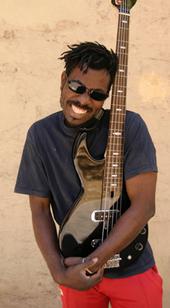Castellano
El de kuami es un repertorio compuesto por variedades africanas polirÃtmicas, que el artista define como AFRO-LATIN-REGGAE...
Pero sin duda el énfasis está en sus mensajes, transmitido en idiomas de Africa occidental (fon, ewe, goun, adja y yoruba entre otros) y europeas (francés, inglés, y español) en formato multilingüe, que apela a la dignidad humana, igualdad de derechos y armonia entre gentes, pueblos y culturas, con el transfondo mÃstico-filosófico que caracteriza a las culturas del oeste de Africa...
KUAMI MENSAH GNONNAS, entre la música afro-cubana (salsa) de la que ha bebido musicalmente toda su vida gracias a su padre el MAESTRO GNONNAS PEDRO (ex lÃder del grupo panafricano: AFRICANDO) y el reggae que es su vibración, lleva defendiendo sus colores musicales AFRO-LATIN-REGGAE, junto a su grupo AFASA desde 1993 que se fundó en la Rep. de Benin, y sigue con este proyecto en España junto a su grupo multiracial, compuesto por músicos de: Japón, España, Francia, Cuba, Colombia y Benin...
KUAMI MENSAH lleva dedicando desde años su lucha para defender y colaborar con los “sin techo†y demás africanos que entran en España a través de pateras, cayucos o saltando las vallas de Melilla...
“La vida para mà no tiene sentido si no encuentro un momento para los demás, y despues de 400 años de esclavitud, 100 años de colonización y 50 años de independencia globalizada, es tiempo ya! para que se empiece a tratar a Africa y a los africanos con más respecto e igualdadâ€.
Kuami MensahEnglish
Kuami’s repertory is composed of various African polyrhythms, which he defines as AFRO-LATIN-REGGAE…
There’s no doubt that the main emphasis is in the lyrics, transmitted through languages from western Africa (fon, ewe, goun, adja and Yoruba among others) and European (French, English, and Spanish) in a multilingual format, which appeals to all human dignity, equal rights and harmony among all peoples and cultures, with a mystical-philosophical background which characterizes the cultures of western Africa.
KUAMI MENSAH GNONNAS, between Afro-Cuban music (salsa) of which has musically drank all his life thanks to his father, MASTER GNONNAS PEDRO (ex leader of panafrican group AFRICANDO) and reggae which is his vibration, continues defending his musical colors AFRO-LATIN-REGGAE, along with his group AFASA since 1993 which he began in the Republic of Benin, and continues with this project in Spain along with his multiracial group, composed of musicians from Japan, Spain, France, Cuba, Colombia and Benin.
KUAMI MENSAH has dedicated years in his fight to defend and collaborate with the homeless and Africans who find their way to Spain in overcrowded wooden boats and canoes or by climbing fences in Melilla…
“Life for me doesn’t make sense if I can’t find a moment for the rest of the people, and after 400 years of slavery, 100 years of colonization and 50 years of globalised independence the time has come to treat Africa and the African people with more respect and equality.â€
Kuami Mensah
Open Contracting:www.myspace.com/kuamimensah
(oo34)652 028 713
www.youtube.comFrançais
Pour parler de son répertoire multi-rythme, Kuami Mensah, le définit comme du « AFRO-LATIN-REGGAE »...
Les messages véhiculés dans les textes de Kuami en langues de l´Afrique occidentale (fon, ewe, goun,adja et yoruba entre autre ) et en langues européennes ( français, anglais et espagnol ) font appel à la dignité humaine, à l’égalité des droits et à l´harmonie entre les peuples et les cultures ; tout cela avec un fond mystique et philosophique qui caractérise les cultures de l´Afrique de l´ouest...
KUAMI MENSAH GNONNAS,dans la fusion de couleurs musicale afro-cubaine (salsa) qui pour lui est un heritage paternel ( MAESTRO GNONNAS PEDRO, ex-chanteur et leader du groupe panafricain: AFRICANDO ), et le reggae qui est son VIB (dit il), défend son style AFRO-LATIN-REGGAE en compagnie de son projet AFASA, depuis 1993 dans la Rep du Benin et continue en Espagne depuis 2002 avec sa formation multiraciale,composée de musicos: japonnais, français, cubains, colombiens, argentins, bresiliens, espagnols et beninois...
L´artiste depuis quelques années, se consacre à la lutte pour la défense et la solidarité avec les "sans abri" de la ville de Valence, et autres émigrants clandestins qui rentrent en Europe par « pateras » ou en sautant la barrieres entre Ceuta et Mélille...
" La vie pour moi n´a pas de sens si je ne trouve pas un instant pour les autres...Après 400 années d´esclavage, un siècle de colonisation, et 50 ans d´indépendance globalisée, je crois qu´il est temps de traiter l´Afrique et les africains avec un peu plus de respect..."
Deutch
Kuami ist ein zusammengesetztes Repertoire von verschiedenen afrikanischen vielsprachigen Rhythmen, die der Künstler als AFRO-LATIN-REGGAE definert.
Aber ohne Zweifel liegt seine Emphase in seinen Botschaften, ausgedrückt in west-afrikanischen Sprachen (fon, ewe, goun, adja und yoruba unter anderem) und europäischen Sprachen (französisch, englisch und spanisch) in einem vielsprachigen Format, das an die Menschewürde appeliert, Gleichheit der Menschenrechte und Harmonie zwischen Menschen, Dörfern und Kulturen, mit einem philosophisch-mystischen Hintergrund, der die westliche Kultur Afrikas charakterisiert.
Kuami Mensah Gnonnas hat sich sein ganzes Leben lang dank seines Vaters MAESTRO GNONNAS PEDRO (Ex_Leiter der panafrikanischnen Gruppe:AFRICANDO) zwischen afro-kubanischer (Salsa) Musik bewegt and Reggae ist seine Vibration, er verteidigt seine musikalischen Farben AFRO-LATIN-REGGAE mit seiner Gruppe AFASA seit 1993, diese wurde in der Republik Benin gegründet und inzwischen ist die Gruppe auch in Spanien vertreten, zusammengesetzt von Musikern aus Japan, Spanien, Frankreich, Kuba, Kolumbien und Benin….
Kuami Mensah kämpft seit Jahren für die Verteidigung und Zusammenarbeit “obdachlos†und für die Afrikaner die nach Spanien kommen mit Hilfe von primitiven Booten oder Holzkanus oder die versuchen Zäune von Melilla zu überwinden…..
“Das Leben macht für mich keinen Sinn, wenn ich keine Zeit für andere Menschen finde und nach 400 Jahren Sklaverei, 100 Jahren Kolonie und 50 Jahren globale Unabhängigkeit ist es an der Zeit, das man Afrika und die Afrikaner mit mehr Respekt und Gleichheit behandeltâ€
